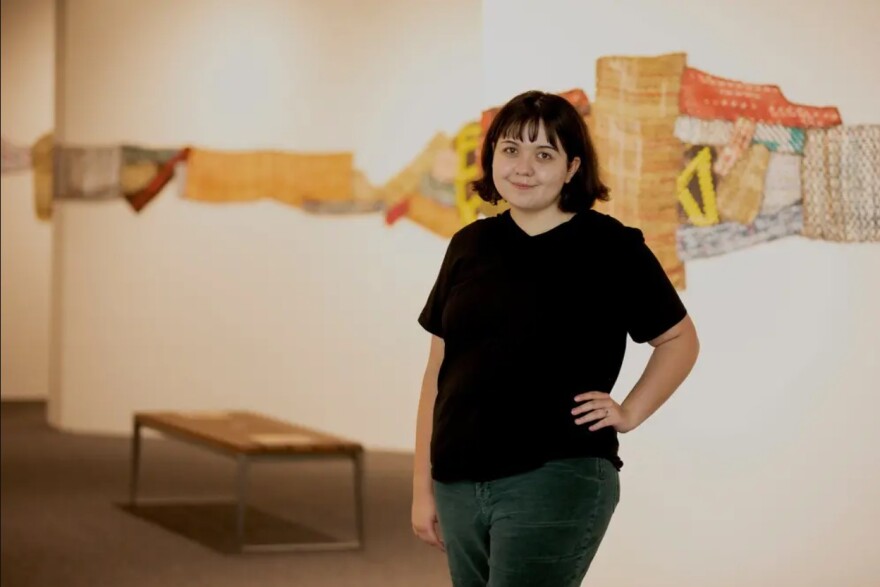ODESSA — Katelan Crowder woke up in her childhood bedroom. Her dog, Daisy, was still snoring.
A year had passed since she graduated from high school, and the University of Texas student returned to her West Texas home for an unexpected reason: a summer internship.
The rising sophomore’s passion for design could have kept her in the ever-expanding metropolis of Austin or sent her to either coast. But living in those larger cities is expensive. And as much as she wanted to escape Odessa, a program that reconnects UT-Austin students with businesses for summer internships in their hometown appealed to her.
“We used to bond over hating Odessa,” Crowder said, referring to her high school friends. “But being here made me realize the good. I bonded so well with the people during the internship.”
Crowder, who is ending a nine-week research internship at the Ellen Noël Art Museum, is one of four UT students who returned to the Permian Basin this summer as part of the university’s Home to Texas program. It’s the third year businesses in Odessa and nearby cities have partnered with UT to bring students back to the blue-collar region known for high school football and oil fields.
Smaller industrial cities and rural towns in Texas and across the nation have long struggled to attract talent, much less retain bright-eyed students. To combat the phenomena of “brain drain,” organizations from rural chambers of commerce to school districts and universities have worked to establish programs that encourage young people to keep their talents in their backyards.
UT-Austin piloted an earlier version of the program in 2019, aimed at diversifying internship opportunities for undergraduate students. The program — which includes a $5,000 scholarship — attracted roughly 100 applications that year, said Dustin Harris, the program’s coordinator. Four years on, the program has only grown. This year, 420 students applied. Sixty-seven were placed in more than a dozen Texas towns, including nearby Midland and Big Spring.
“It’s never been more competitive to be a homegrown student,” Harris said during a recent reception for the West Texas interns.
At the museum, Crowder worked on several marketing and research projects. She even helped curate an exhibition.
Megan Baeza, director of internships and employer relations at UT-Permian Basin, said these internships are a boon for rural communities with limited access to a deep talent pool.
Sheila Perry, the executive director of Ellen Noël, said having summer interns reinvigorates her faith in the future.
“Katelan taught us to have a fresh perspective,” Perry said.
UT-Austin’s program has included more placements in the state’s largest cities, but Harris said he hopes the success in Odessa, Midland and Big Spring will inspire other smaller cities and towns.
“The idea of return migration has been around for a long time,” said Josh Wyner, executive director of the college excellence program at the Aspen Institute, a nonprofit think tank that works across various sectors including education, health and business.
To keep students in their hometowns, colleges and businesses need a strong relationship that produces relevant coursework during the fall and spring semesters and practical on-the-job training during the summer, Wyner said.
Wyner stressed for return migration to work, business leaders must take an active role in partnerships with higher education institutions.
“Employers have to lead,” Wyner said.
The formula UT-Austin and the Permian Basin businesses have established appears to be working. Several of the students who returned home this summer said they’re seeing their hometowns in a new way and are considering returning full-time after earning their degrees.
In Big Spring, William Cole interned this summer at the city attorney’s office. He’d never have the same up-close experience at a big-city law firm, he said.
“It really opened my eyes on being deadset about coming back,” he said.
Elizabeth Aguilar was offered a window into work-from-home life. She spent the summer living in her hometown of Midland but working on a project for the Initiative for Law, Societies, and Justice, a project based at UT-Austin studying different issues affecting Texans, including the criminal legal system and the mental health field.
Aguilar learned about available mental health providers in the Permian Basin by compiling information on the region’s hospitals and treatment centers.
Aguilar and her family moved to Midland in 2012. Like Crowder in Odessa, Aguilar grew up thinking there would be no professional opportunities after college. Now she wants to help break the stereotypes of the Permian Basin.
“This internship caught me by surprise,” Aguilar said. “I want to help build a place ‘little me’ would want to grow up in.”
Still, area business leaders admit they need to do more to make coming home inviting.
“There needs to be more to do,” said Debbye ValVerde, executive director of the Big Spring Area Chamber of Commerce. “A lot of rural communities may not have what they want to do in life.”
Reneé Earls, president of the Odessa Chamber of Commerce, said cities, especially those like Odessa, known widely for a singular industry, must reinvent themselves.
“We can’t do what we’ve always done. We want people invested here,” she said. “The saying in Odessa is that there’s nothing to do, and that’s just not the case.”
Disclosure: The University of Texas has been a financial supporter of The Texas Tribune, a nonprofit, nonpartisan news organization that is funded in part by donations from members, foundations and corporate sponsors. Financial supporters play no role in the Tribune's journalism. Find a complete list of them here.
This article originally appeared in The Texas Tribune at https://www.texastribune.org/2023/08/02/university-texas-hometown-internship/.
The Texas Tribune is a member-supported, nonpartisan newsroom informing and engaging Texans on state politics and policy. Learn more at texastribune.org.
Copyright 2023 KTTZ 89.1FM. To see more, visit KTTZ 89.1FM. 9(MDA4OTAxNzAzMDEzMjc0MTc2MzA5ZDZlMw004))







